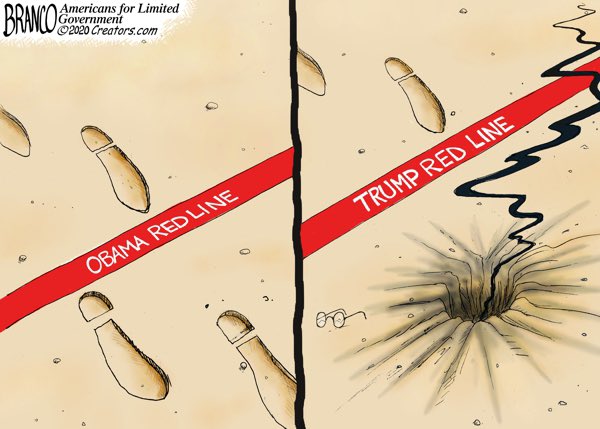The Death of Qassem Suleimani Is a Strategic Victory for the U.S.
Last week, an American drone strike killed Qassem Suleimani, who for over two decades led Iran’s Quds Force—which of late has been fighting wars in Syria, Iraq, and Yemen—and managed a network of proxy militias and terrorist groups throughout the Middle East. Among Suleimani’s accomplishments are the transformation of Hizballah into a military powerhouse and the creation of guerrilla forces that have killed hundreds of Americans in Iraq, and many more Iraqis. President Trump had until now refrained from responding militarily to the Quds Force’s multiple attacks on American allies and even military hardware throughout the region since he came to office. But the killing of a U.S. contractor changed the equation.
Joining a number of other Israeli experts in commenting on the significance of Suleimani’s death, Hillel Frisch explains why it is more than a merely tactical success:
Suleimani’s death is a major blow to Iran. Ayatollah Ali Khamenei’s designation of Esmail Ghaani, Suleimani’s second-in-command, as his successor as head of the Quds Force is an indicator of the magnitude of that blow. Ghaani is in his sixties (as was Suleimani)—not the ideal age to take over a major undercover organization with tentacles throughout much of the Middle East and beyond.
Over twenty years ago . . . a younger, more vibrant Islamic revolutionary leadership chose then-forty-year-old Suleimani over his superiors to head the elite [Quds Force]. Khamenei is older now, and less willing to take the risk of choosing a daring young commander, but that is not the only reason why he did not do so.
Even if the ayatollah were inclined to select a younger replacement, the targeting of Soleimani prevents him from making such a choice. The killing proves beyond doubt that the Iranian security system is riddled with informants. . . . The killing of Soleimani was, [moreover, a meaningful] show of American force because he was touted by Iran as invincible.
Soleimani, the Blob, and the Echo Chamber
At one level the complaints are inescapably partisan; Democrats complaining about the Trump Administration is the first and only law of American politics today. Parallel complaints regarding process, wisdom, and ultimately fitness for office were leveled at Obama by Republicans and will be again, but they hardly reached the current level of antipathy directed at Trump. The questions then become not simply whether Trump's policy decision was correct, but whether critics adopting such tones of ill-disguised hatred are themselves to be trusted.Alan M. Dershowitz (WSJ Google Link): Easy Call: The Strike on Soleimani Was Lawful
But the responses to Soleimani have additional relevance not simply because of their partisanship and self-referential elevation of expertise, which illustrate if nothing else the processes of elite groupthink. They anticipate a possible future, namely the way Democratic presidential candidates uniformly disapproved of killing Soleimani.
Current frontrunner and former Obama Vice President Joe Biden likened the act to throwing "a stick of dynamite into a tinderbox." Elizabeth Warren acknowledged "Soleimani was a murderer, responsible for the deaths of thousands, including hundreds of Americans. But this reckless move escalates the situation with Iran and increases the likelihood of more deaths and new Middle East conflict." Finally, Bernie Sanderswarned "Trump's dangerous escalation brings us closer to another disastrous war in the Middle East that could cost countless lives and trillions more dollars."
The parallels between the blob/echo chamber and the Democratic candidates illustrate their interlocking nature; Obama veterans would return under Biden or Warren, while Sanders likely bring in ideologue outsiders, such as his foreign policy advisor, progressive blogger Matt Duss. But they also illustrate common intellectual foundations, the elevation of process and celebration of expertise, the search for predictability and corresponding avoidance of disruption. Readiness to be gamed by canny adversaries is thus built in.
The candidates' responses are thus a foreshadowing of a future Democratic administration. Like most members of the blob and the echo chamber, the candidates have already stated they would recommit to the JCPOA nuclear deal (which of course may not longer be possible). But they would likely return to the Obama policy of indulging Iran's 'legitimate regional aspirations,' 'security concerns,' and Islamic government, even as they offer tepid criticism, as means of restructuring American relations away from Israel and Saudi Arabia.
Still, every new administration has to deal with reality bequeathed by its predecessors. The killing of Soleimani may, or may not, upend the chessboard of Iranian imperial expansion, much less unleash World War III. As the new reality unfolds, the question remains whether experts on all sides of the equation are willing to rethink their premises and contend with the world as it is now. First indications are not promising.
There can be no serious debate about the president's constitutional authority to order a single attack on an enemy combatant who has killed and is planning to kill American citizens. Presidents Bill Clinton, George W. Bush and Barack Obama issued such orders.Shmuley Boteach: Killing Soleimani was a moral response
The targeting of Soleimani was more justified, as a matter of law, than the targeting of Osama bin Laden in 2011. The killing of Soleimani was in large part an act of prevention, whereas the killing of bin Laden was primarily an act of retaliation.
The killing of Soleimani was also entirely legal under international law. The Quds Force commander was a combatant in uniform who was actively engaged in continuing military and terrorist activities against Americans. The rocket that killed him and a handful of others was carefully calibrated to minimize collateral damage, and the resulting death toll was proportionate to the deaths it may have prevented.
Like Hitler, Soleimani had a knack for survival. He was reported killed in 2006, 2012 and 2015 – only to show up, time after time, alive and well with a sinister grin. Would yet another practitioner of genocide be allowed to live, into the second decade of the second millennium?
He would, but only for a mere few days. His being considered the second-most powerful man in Iran wouldn’t stop Trump from imposing the most basic law of human justice – that there’s a death sentence for those who engage in genocide.
IN KILLING Soleimani, Trump has finally managed to do what no American president has managed to do before: put Iran on notice that it’s not primarily ordinary Iranians who will suffer for the crimes of their leaders, but, rather, the leaders themselves would pay the ultimate price.
The corrupt Iranian mullahs who slaughter their own people, steal their wealth, and bring terrorism and mayhem to the world are now on notice that they are squarely in American sites for justice.
In his lifetime, Soleimani sought to prove that evil and brutality will ultimately triumph over goodness and mercy. With Soleimani’s death, Trump has proven that those tactics are no match for God’s cosmic force of justice.
Martin Luther King, the greatest American of the 20th century, put it best: “The arc of the moral universe is long, but it bends toward justice.






































.jpg)

